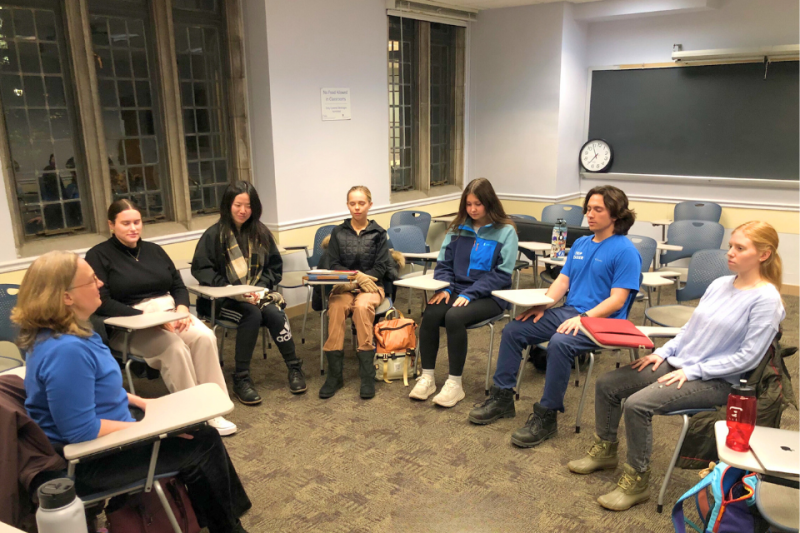
Mindfulness practices such as meditation have been shown to reduce anxiety and depressive symptoms and improve one’s sense of well-being. But what is it about these practices that produces these benefits?
That’s one of the key questions Moria Smoski, PhD, an associate professor in psychiatry and behavioral sciences, and Joseph Diehl, a clinical psychology PhD student, are exploring with an interdisciplinary student research team they co-lead. “The questions of ‘why and how’ can be important because they can help us learn how to improve these interventions,” Smoski said.
They’re also investigating the psychological benefits and downsides of letting your mind wander versus—as Smoski puts it—“keeping your mind on a leash,” or intentionally redirecting your focus to the present moment when your thoughts go astray, a central component of meditation.
Meditative Practice Compared to Health Intervention
The team will study the impact of meditative practice on Duke students enrolled in Koru Mindfulness, a four-week program developed at Duke and delivered by the Student Wellness Center, compared to the effects of a student health intervention of the same duration focusing on stress management, sleep, exercise, and nutrition. The latter program will be facilitated by Diehl and clinical psychology PhD student Carolina Daffre.
Participants will be randomized to one of the two groups. Using surveys as well as EEG data, the team will assess whether the activities reduced negative symptoms such as anxiety and depression, as well as whether they increased positive feelings such as a sense of flourishing, intellectual humility, and self-compassion.
The team, composed of undergraduate and graduate students from disciplines ranging from mechanical engineering to biology to theological studies, began their work together this fall. As they prepare to begin collecting data in the spring, they’re engaging in contemplative practices together, drawing on a variety of religious and philosophical traditions, and sharing their experiences, as well as getting up to speed on data collection and analysis techniques. For example, clinical psychology doctoral student Armen Bagdasarov is teaching the team how to analyze EEG data.
The Bass Connections Initiative
The project is part of Bass Connections, a Duke University initiative that brings together faculty, postdoctoral associates, graduate students, undergraduates, and external partners to tackle complex societal challenges in interdisciplinary research teams. Bass Connections projects are aligned with thematic areas such as Brain & Society, Energy & Environment, and Health Policy & Innovation. Teams seek to establish core connections across disciplines, across learner levels, and between the university and the broader world.
“It’s members of the campus investing in the betterment of their own community. I love that there’s that collaborative spirit and investment at the undergraduate, graduate, and faculty levels. That feels really beautiful.”
— Joseph Diehl
Through his experiences as a graduate student and teaching assistant, Diehl has observed that “there seems to be a lot of suffering on campus, and students are looking for resources and ways to be supported.” Bass Connections, he noted, serves as an ideal model to help address this need: “It’s members of the campus investing in the betterment of their own community. I love that there’s that collaborative spirit and investment at the undergraduate, graduate, and faculty levels. That feels really beautiful.”
Smoski agrees, noting, “The ability to have a research team of individuals caring for themselves and for each other—that’s the intentional community building piece of it, and that becomes the structure in which you can answer a research question as well. I think it’s just really unique to the Bass program.”
The project was recently renewed for a second year, extending it the 2024-2025 academic year. The team anticipates generating one or more publications, a conference talk, undergraduate-led posters, and concrete recommendations for development of undergraduate-based contemplative groups that can be disseminated nationally.
Other Bass Connections/Psychiatry Projects
Other current and recent Bass Connections projects co-led by Psychiatry & Behavioral Sciences faculty members include:
- Economic Evaluation of School-Based Mental Health Systems
Co-led by Jeylan Close, MD (Psychiatry) and Nicole Lawrence, PhD (Public Policy)
- Non-Invasive Neuromodulation for Addiction
Co-led by Jean Beckham, PhD, Jonathan Young, MD (both from Psychiatry), and Carri Polick, PhD (Nursing)
- Developing Best Practices for Trauma-Informed Teaching & Learning
Co-led by Warren Kinghorn, MD, ThD (Psychiatry) and Jan Holton, PhD (Divinity)
- Promoting Female Sexual Well-Being Through Research and Education
Co-led by Caroline Dorfman, PhD, Rebecca Shelby, PhD, and Juliann Stalls, PhD (all from Psychiatry), and Sara Arthur (Psychology & Neuroscience)
- Improving Access to Behavioral and Mental Health Services for Latinx Children in NC
Co-led by Jeylan Close, MD (Psychiatry), Michelle Franklin, PhD (both from Psychiatry), Rushina Cholera, MD, PhD (Pediatrics), and Andrea Thoumi, MPP, MSc (Margolis Center for Health Policy)